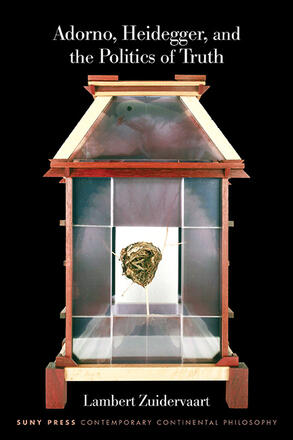
Adorno, Heidegger, and the Politics of Truth
Alternative formats available from:
A critical and creative reconstruction of Adorno's conception of truth that shows its relevance for contemporary philosophy, art, and politics.
Description
An elusive and complex idea of truth lies at the center of Theodor Adorno's thought. Yet he never spells out what it is. Through close readings of Negative Dialectics, Aesthetic Theory, and related course lectures, Lambert Zuidervaart reconstructs Adorno's conception of truth, contrasts it with the conceptions of Martin Heidegger and Michel Foucault, and explores its relevance for contemporary philosophy, art, and politics. Adorno regards truth as a dynamic constellation in which various dialectical polarities intersect. The most decisive polarity, Zuidervaart argues, occurs between society as it has developed and the historical possibility of a completely transformed world. Critically reconstructed, Adorno's conception of truth can help inspire hopeful critiques of an allegedly post-truth society.
Lambert Zuidervaart is Emeritus Professor of Philosophy at the Institute for Christian Studies and the University of Toronto. His many books include Social Domains of Truth: Science, Politics, Art, and Religion and Shattering Silos: Reimagining Knowledge, Politics, and Social Critique.
Reviews
"…this book is both an accessible introduction to Theodor Adorno and his philosophy of truth and an important contribution to the philosophical scholarship that links Adorno's truth to Heidegger's and Foucault's, making it of interest to current scholars of each. But it is also a book with its own politics of truth, one derived from Adorno, that humanity has the power and agency to produce a utopia where the false has become the true." — H-Net Reviews (H-History-and-Theory)
"Zuidervaart, who already published numerable books on critical theory in general and Adorno in particular, again shows himself to be an excellent and critical reader of Adorno. The greatest strength of Adorno, Heidegger, and the Politics of Truth is that it offers an in-depth study of Adorno's concept of truth, based on a thorough reading and understanding, and an original and critical interpretation of Adorno's work. It also surpasses that in demonstrating the need for a conception of 'truth as a whole' beyond propositional truth, and the need to link the concept of truth to social critique and social hope. All this makes this book a must-read for Adorno scholars." — Thijs Lijster, author of Benjamin and Adorno on Art and Art Criticism: Critique of Art